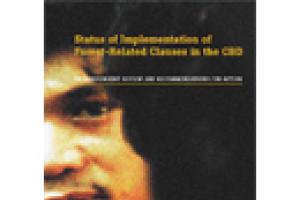Community forests are a new kind of mechanism of progressive local community responsibility for forest and forest resource management. So far, thirty-five community forests have been allocated by the Ministry of the Environment.
The results of management models developed so far have been discrete and limited, and experience is fairly recent. Most of them are still at a learning stage.
Cameroon
Bulletin articles
7 September 2002
Since the 19th century the land rights of forest dwellers in Cameroon have not figured in the major decisions by the rulers. All forest lands, defined as vacant and without owners --“vacant et sans maitres”-- became property of the state, and many forests were then opened for timber exploitation, which closed those areas for hunting by Bagyeli, Baka, and other so-called "Pygmy" hunter gathering communities, whose presence across Southern Cameroon predates the colonial State.
Bulletin articles
15 April 2002
On 22 March 2002, Master Council William Bourdon placed civil charges in the hands of Investigating Magistrates of Paris filed in the name of seven Cameroonian villagers condemning criminal destruction of property, forgery and the utilization of forgery, fraud, posession of stolen goods, and corruption of officials against both directors of the Doumé Affiliated Forestry Company (SFID) group and the Cameroonian Legal Society, as well as their mother corporation ROUGIER S.A.
Other information
18 March 2002
Commissioned by the Global Forest Coalition
This report is based on 21 country case studies, including Australia, Brazil, Cameroon, Canada, Chile, Colombia, Czech republic, Ghana, India, Indonesia, Kenya,Malaysia, the Netherlands, New Zealand/Aotearoa, Papua New Guinea, Russia, South Africa, Suriname, Uganda, United Kingdom, and Uruguay
Bulletin articles
16 March 2002
When described by European officials, the world seems to be divided in two different sets of governments. "Their" world appears to have taken on board environmental --and even social-- concerns, while "corrupt" Southern governments continue destroying the environment. Such simplistic picture does not take into account that the causes of environmental destruction in the South are very frequently rooted in the North. The following example helps to better understand the issue.
Bulletin articles
21 December 2001
In Cameroon, as in many other countries in the South, a process of deforestation is taking place directly and indirectly caused by intensive industrial logging. This process is generally promoted by political reforms and by loans from the European Union, the World Bank, the International Monetary Fund or the World Trade Organisation for the construction of mega-projects such as highways or dams.
Bulletin articles
11 August 2001
Cameroon, with a population of around 15 million and a territory of 475,440 sq km, has an estimated 22 million hectares of forests, 64% of which are tropical rainforests lying at the southern part of the country, while the remaining 36% are in the central and northern Savannah areas. Atlantic coastal forests grow in areas with relatively fertile soils and hold some of the greatest biodiversity found anywhere in Africa.
Bulletin articles
12 July 2001
According to Cameroonian law, both local communities and industrial logging companies have the right to obtain and manage a portion of a forest. However, this apparent "equality" is extremely unequal regarding the extension of forest lands and the legal obligations associated with tenure rights.
Bulletin articles
12 June 2001
Oil palm plantations in Cameroon cover more than 80,000 hectares divided in three different sectors: 1) large scale industrial plantations, with some 58,000 hectares; 2) Village plantations comprising 12,000 hectares and 3) "Informal" plantations covering some 10,000 hectares.
Bulletin articles
12 April 2001
“This is the world’s most scrutinized and controlled project,” retorted a senior French official in Chad to representatives of Chadian human rights organizations who went to see him in March 2001. “There is absolutely nothing to worry about”, he added. However, many people are very worried and have been fighting against the project for a very long time.
Bulletin articles
13 February 2001
The Cameroonian Center for Environment & Development (CED) has sent out the first issue of "Inside Cameroon", a monthly electronic bulletin in English containing update information on environment, development, economics and Human Rights issues in that country. A French version will be available soon. This first bulletin provides detailed information and clear analysis on a number of crucial environmental and social issues, as detailed in the table of contents:
Bulletin articles
13 February 2001
A study, published by IITA and CIFOR in 1997, on the production and consumption of firewood and the relationship between this use of wood and deforestation in southern Cameroon shows interesting results, which question some of the myths related to the responsibility of the rural poor in forest destruction as well as on the alleged benefits of plantations to counteract it.

